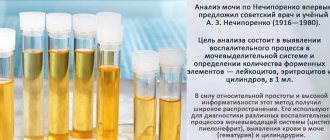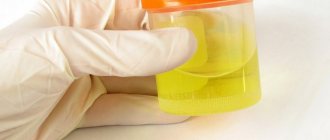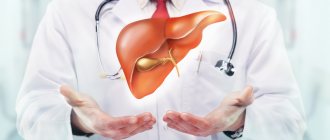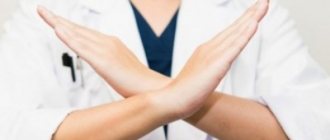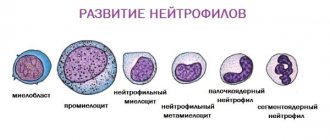Glucose tolerance test
It is carried out only if there are preliminary results of determining glucose on an empty stomach, without load. The glucose content in blood plasma is determined on an empty stomach and 2 hours after a glucose load. It is necessary to follow a normal diet (with carbohydrate content > 125-150 g per day) and adhere to the usual physical activity for three days before the study. The study is carried out in the morning on an empty stomach after an overnight fast for 10-14 hours (during this time you should not smoke or drink alcohol). During the study, the patient should lie or sit quietly, not smoke, not be overcooled, and not engage in physical activity. It is not recommended to conduct research after and during stress, after operations and childbirth, during inflammatory processes, alcoholic cirrhosis of the liver, hepatitis, during menstruation, and in gastrointestinal diseases with impaired glucose absorption. Before the test, it is necessary to exclude medical procedures and medications (adrenaline, glucocorticoids, contraceptives, caffeine, thiazide diuretics, psychotropic drugs and antidepressants).
Fully or partially limited products
From the diet per day, completely exclude fried, smoked, fatty and spicy foods, all fish, meat and dairy products, canned meat and fish, poultry, rabbit, eggs, animal and cooking fat, oil (including vegetable oil), nuts, highly carbonated, tonic and caffeine-containing drinks (tea, coffee, cola, Pepsi), chocolate, dates. Avocados, bananas, oranges, lemons and tangerines are excluded from fruits. From greens - cilantro, dill. Drinking alcoholic beverages is not allowed.
Table of prohibited products
| Proteins, g | Fats, g | Carbohydrates, g | Calories, kcal | |
Vegetables and greens | ||||
| vegetables legumes | 9,1 | 1,6 | 27,0 | 168 |
| sauerkraut | 1,8 | 0,1 | 4,4 | 19 |
| bulb onions | 1,4 | 0,0 | 10,4 | 41 |
| cucumbers | 0,8 | 0,1 | 2,8 | 15 |
| white radish | 1,4 | 0,0 | 4,1 | 21 |
| celery (root) | 1,3 | 0,3 | 6,5 | 32 |
| horseradish | 3,2 | 0,4 | 10,5 | 56 |
| garlic | 6,5 | 0,5 | 29,9 | 143 |
| spinach | 2,9 | 0,3 | 2,0 | 22 |
| sorrel | 1,5 | 0,3 | 2,9 | 19 |
Mushrooms | ||||
| mushrooms | 3,5 | 2,0 | 2,5 | 30 |
Nuts and dried fruits | ||||
| nuts | 15,0 | 40,0 | 20,0 | 500 |
| dried fruits | 2,3 | 0,6 | 68,2 | 286 |
Flour and pasta | ||||
| vareniki | 7,6 | 2,3 | 18,7 | 155 |
| dumplings | 11,9 | 12,4 | 29,0 | 275 |
Confectionery | ||||
| candies | 4,3 | 19,8 | 67,5 | 453 |
| cookie | 7,5 | 11,8 | 74,9 | 417 |
Cakes | ||||
| cake | 4,4 | 23,4 | 45,2 | 407 |
Chocolate | ||||
| chocolate | 5,4 | 35,3 | 56,5 | 544 |
Raw materials and seasonings | ||||
| seasonings | 7,0 | 1,9 | 26,0 | 149 |
| mustard | 5,7 | 6,4 | 22,0 | 162 |
| ginger | 1,8 | 0,8 | 15,8 | 80 |
| ketchup | 1,8 | 1,0 | 22,2 | 93 |
| mayonnaise | 2,4 | 67,0 | 3,9 | 627 |
| ground black pepper | 10,4 | 3,3 | 38,7 | 251 |
| chilli | 2,0 | 0,2 | 9,5 | 40 |
Dairy | ||||
| dairy products | 3,2 | 6,5 | 4,1 | 117 |
| cream 35% (fat) | 2,5 | 35,0 | 3,0 | 337 |
Cheeses and cottage cheese | ||||
| cheese | 24,1 | 29,5 | 0,3 | 363 |
Meat products | ||||
| pork | 16,0 | 21,6 | 0,0 | 259 |
| salo | 2,4 | 89,0 | 0,0 | 797 |
| bacon | 23,0 | 45,0 | 0,0 | 500 |
| ham | 22,6 | 20,9 | 0,0 | 279 |
Sausages | ||||
| dry-cured sausage | 24,1 | 38,3 | 1,0 | 455 |
| sausages | 10,1 | 31,6 | 1,9 | 332 |
Bird | ||||
| fried chicken | 26,0 | 12,0 | 0,0 | 210 |
| smoked chicken | 27,5 | 8,2 | 0,0 | 184 |
| duck | 16,5 | 61,2 | 0,0 | 346 |
| goose | 16,1 | 33,3 | 0,0 | 364 |
Fish and seafood | ||||
| smoked fish | 26,8 | 9,9 | 0,0 | 196 |
| canned fish | 17,5 | 2,0 | 0,0 | 88 |
Oils and fats | ||||
| vegetable oil | 0,0 | 99,0 | 0,0 | 899 |
| butter | 0,5 | 82,5 | 0,8 | 748 |
| cooking fat | 0,0 | 99,7 | 0,0 | 897 |
Alcoholic drinks | ||||
| dry white wine | 0,1 | 0,0 | 0,6 | 66 |
| dry red wine | 0,2 | 0,0 | 0,3 | 68 |
| vodka | 0,0 | 0,0 | 0,1 | 235 |
| cognac | 0,0 | 0,0 | 0,1 | 239 |
| beer | 0,3 | 0,0 | 4,6 | 42 |
Non-alcoholic drinks | ||||
| bread kvass | 0,2 | 0,0 | 5,2 | 27 |
| * data is per 100 g of product | ||||
Hormones
Blood for hormonal studies must be donated on an empty stomach in the morning. If this is not possible, blood can be donated for some hormones 4-5 hours after the last meal in the daytime and evening (except for those studies for which blood must be donated strictly in the morning).
1-2 days before the test, exclude high-fat foods from the diet; the last meal should not be large. 1 day before the study, psycho-emotional and physical comfort (calm state without overheating and hypothermia) is necessary.
• Thyroid hormones
When initially checking thyroid hormone levels, discontinue medications that affect thyroid function 2-4 weeks before the test. When monitoring treatment, exclude taking medications on the day of the study and be sure to note this on the referral form (also note information about taking other medications - aspirin, tranquilizers, corticosteroids, oral contraceptives).
• Sex hormones
In women of reproductive age, the results of hormonal studies are influenced by physiological factors associated with the stage of the menstrual cycle. During the examination for sex hormones, the phase of the menstrual cycle should be indicated. Hormones of the reproductive system must be taken strictly on the days of the cycle:
- LH, FSH - 3-5 days of the cycle;
- Estradiol - 5-7 or 21-23 days of the cycle;
- Progesterone - days 21-23 of the cycle.
- 17-OH-progesterone, DHA - sulfate, testosterone - days 7-9 of the cycle.
- Prolactin - donate blood in the morning at rest; before the study, exclude palpation of the mammary glands.
Diet and nutrition system of the donor - nuances and rules
The entire lifestyle of a person who has devoted himself to helping others should be conducive to maintaining his health at the proper level.
The general requirements for proper nutrition and giving up bad habits work not only two days or a week before the procedure - ideally, they should be followed constantly.
To ensure that donation does not cause harm to either the donor or the recipient, doctors advise stopping drinking alcohol, limiting smoking, periodically taking vitamin complexes, adhering to a sleep and rest schedule, and observing certain intervals between donation procedures. In fact, the listed items are a list of everyday habits of a healthy person.
As for the daily diet, the donor needs to receive a certain amount of proteins, fats, mineral salts, iron every day, and also maintain water balance by consuming an appropriate amount of liquid. It is important to receive the amount of calories needed for the normal functioning of the body - it is calculated depending on weight, age, and lifestyle. This means that you need to monitor your diet constantly, and not just immediately before the procedure. If possible, it is better to limit the consumption of fatty, fried, smoked meats, marinades, store-bought sauces, sweets, and energy drinks.
Two days before donation, you need to switch to a diet and adhere to certain rules.
Blood test for infections
Blood is donated in the morning on an empty stomach (or in the afternoon and evening, 4-5 hours after the last meal). 1-2 days before the test, exclude high-fat foods from your diet. Before donating blood for viral hepatitis, 2 days before the test, it is advisable to exclude citrus fruits, orange fruits and vegetables from the diet.
The results of tests for the presence of infections depend on the period of infection and the state of the immune system, so a negative result does not completely rule out infection. At an early stage of the disease, seroconversion occurs (absence of antibodies during the acute period of the disease). In doubtful cases, it is advisable to re-test after 3-5 days. A blood test for the presence of IgM class antibodies to infectious agents should be carried out no earlier than 5-7 days from the moment of illness, and IgG and IgA class antibodies no earlier than 10-14 days. This is due to the timing of the production of antibodies by the immune system and their appearance in the blood in the diagnostic titer.
Seal
Authorized Products
Before donating blood for analysis, the diet includes buckwheat porridge from groats, rice porridge in water, pearl barley porridge in water, premium boiled pasta, wheat bread, sliced loaf, white bread crackers, various juices, sweet tea with jam, mineral still water, compotes, fruit drinks, vegetables and fruits: apricots, pears, apples, pomegranates, plums, prunes and dried apricots.
Table of permitted products
| Proteins, g | Fats, g | Carbohydrates, g | Calories, kcal | |
Vegetables and greens | ||||
| cauliflower | 2,5 | 0,3 | 5,4 | 30 |
| boiled cauliflower | 1,8 | 0,3 | 4,0 | 29 |
| potato | 2,0 | 0,4 | 18,1 | 80 |
| boiled carrots | 0,8 | 0,3 | 5,0 | 25 |
| boiled beets | 1,8 | 0,0 | 10,8 | 49 |
Fruits | ||||
| apricots | 0,9 | 0,1 | 10,8 | 41 |
| watermelon | 0,6 | 0,1 | 5,8 | 25 |
| bananas | 1,5 | 0,2 | 21,8 | 95 |
| melon | 0,6 | 0,3 | 7,4 | 33 |
| peaches | 0,9 | 0,1 | 11,3 | 46 |
Berries | ||||
| strawberry | 0,8 | 0,4 | 7,5 | 41 |
| raspberries | 0,8 | 0,5 | 8,3 | 46 |
Cereals and porridges | ||||
| buckwheat | 4,5 | 2,3 | 25,0 | 132 |
| semolina | 3,0 | 3,2 | 15,3 | 98 |
| oatmeal with water | 3,0 | 1,7 | 15,0 | 88 |
| cereals | 11,9 | 7,2 | 69,3 | 366 |
| pearl barley porridge on water | 3,1 | 0,4 | 22,2 | 109 |
| white boiled rice | 2,2 | 0,5 | 24,9 | 116 |
Flour and pasta | ||||
| premium boiled pasta | 3,5 | 0,4 | 23,2 | 112 |
| noodles | 12,0 | 3,7 | 60,1 | 322 |
Bakery products | ||||
| sliced loaf | 7,5 | 2,9 | 50,9 | 264 |
| white bread crackers | 11,2 | 1,4 | 72,2 | 331 |
| wheat bread | 8,1 | 1,0 | 48,8 | 242 |
Confectionery | ||||
| jam | 0,3 | 0,2 | 63,0 | 263 |
| marshmallows | 0,8 | 0,0 | 78,5 | 304 |
| paste | 0,5 | 0,0 | 80,8 | 310 |
Raw materials and seasonings | ||||
| honey | 0,8 | 0,0 | 81,5 | 329 |
| milk sauce | 2,0 | 7,1 | 5,2 | 84 |
Meat products | ||||
| beef stew | 16,8 | 18,3 | 0,0 | 232 |
Bird | ||||
| boiled chicken breast | 29,8 | 1,8 | 0,5 | 137 |
| boiled chicken drumstick | 27,0 | 5,6 | 0,0 | 158 |
| boiled turkey fillet | 25,0 | 1,0 | — | 130 |
Non-alcoholic drinks | ||||
| mineral water | 0,0 | 0,0 | 0,0 | — |
Juices and compotes | ||||
| compote | 0,5 | 0,0 | 19,5 | 81 |
| juice | 0,3 | 0,1 | 9,2 | 40 |
| apricot juice | 0,9 | 0,1 | 9,0 | 38 |
| jelly | 0,2 | 0,0 | 16,7 | 68 |
| pumpkin juice | 0,0 | 0,0 | 9,0 | 38 |
| * data is per 100 g of product | ||||
Contraindications to donation
According to the order of the Ministry of Health dated September 21, 2001, there are absolute and relative prohibitions for donation.
Absolute contraindications:
- infectious diseases (AIDS, syphilis, brucellosis, etc.);
- diseases caused by parasites (toxoplasmosis, filariasis, etc.);
- somatic diseases of various organs (kidneys, liver, heart, lungs, thyroid gland, etc.);
- oncology;
- hypertension II-III degree;
- mental illness;
- recent operations on various organs;
- skin diseases (psoriasis, eczema, lupus, dermatitis, etc.);
- organ transplantation.
Temporary contraindications:
- abortions;
- tattoos;
- acupuncture;
- travel to foreign countries (especially to Africa);
- communication with sick people;
- recent illnesses (ARVI, influenza, etc.);
- removal of a tooth;
- allergic rashes;
- VSD;
- pregnancy;
- period of menstruation;
- taking antibiotics, analgesics;
- consumption of alcoholic beverages;
- vaccinations;
- change in test results.
Time limits vary. For example, after an abortion you cannot donate blood for six months, after a sore throat - for a month, after a tooth extraction - for 10 days.
What to eat in the morning before donation?
The donor's diet is of great importance because the composition of the blood depends on proper nutrition. If you take fatty foods, the blood will be poorly separated into components. In addition, it will have a cloudy tint. Doctors will not approve such blood for donation.
Therefore, before donating blood, you must follow a special diet so that it is most useful for transfusion.
In the morning before delivery, food is prohibited:
- acute;
- fat;
- fried;
- smoked;
- milk;
- chicken eggs;
- oil;
- bananas;
- chocolate;
- dates;
- nuts.
Breakfast before going to the procedure should look like this:
- porridge without milk;
- dry cookies, bagels;
- sweet tea;
- jam;
- fruits;
- vegetables.
You should drink more water in the morning before the procedure, at least two glasses. You can drink juices, fruit drinks, mineral water, compotes.
Results and reviews
A diet before donating blood allows the donor to make this procedure as gentle as possible and receive high-quality donor material. Compliance with the diet before donating blood and diet ensures the reliability of the results obtained.
- “... I’m getting tested for sugar again, because I wasn’t warned that I shouldn’t use chewing gum. And since blood is donated on an empty stomach, I wanted to eat something and, worried, I chewed the entire pack of chewing gum”;
- “... Donor with 15 years of experience. “I endure the procedure and preparation for it, including dietary restrictions, easily and without problems.”
